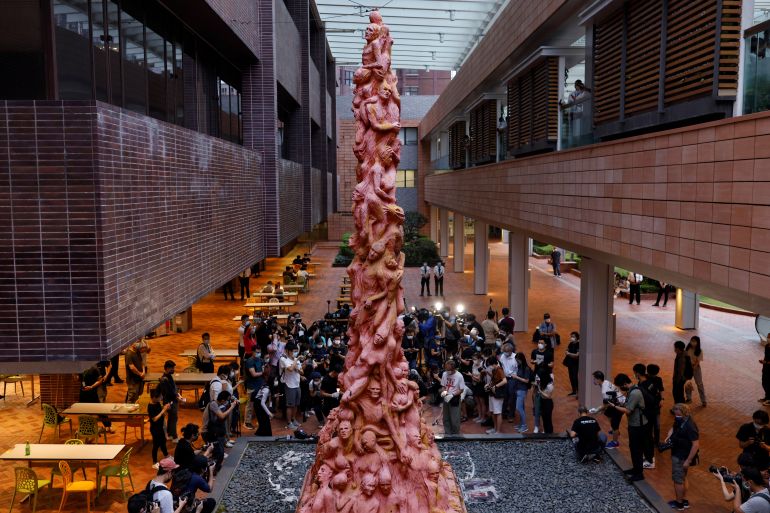Hong Kong: Wall Street Journal piece on art seizure misleading
Hong Kong Secretary for Security Chris Tang says opinion piece misleads readers by describing Tiananmen sculpture as an ‘artwork’.

Hong Kong’s top security official has accused The Wall Street Journal of misleading its readers with an opinion piece that condemned the seizure of a sculpture commemorating the victims of the 1989 Tiananmen Square massacre.
Hong Kong national security police last week seized the Pillar of Shame, an artwork created by Danish artist Jens Galschiøt, as part of an investigation into alleged “incitement to subversion”.
Keep reading
list of 4 itemsRights group denounces ‘brutal’ protest crackdown in Peru
Taliban must ‘swiftly reverse’ crackdown on women’s rights: UN
Rights commission says Peru crackdown may qualify as a ‘massacre’
Police carried out the operation weeks ahead of the June 4 anniversary of the crackdown on pro-democracy demonstrators in central Beijing, the commemoration of which has been outlawed in the Chinese territory since Beijing’s passage of a sweeping national security law in 2020.
The artwork, which depicts 50 torn and twisted bodies to symbolise protesters killed in the massacre, had been in storage since the University of Hong Kong removed it from its campus in the dead of night in late 2021, citing safety reasons and “legal risks”.
In a letter to the Journal on Tuesday, Hong Kong Secretary for Security Chris Tang wrote that it is “totally misleading” to describe the sculpture as an “artwork”.
“Like any other case, to collect evidence following progress of investigation to take forward the case is legal, reasonable and rational,” Tang said in the letter, the text of which was published in the media outlet Hong Kong Free Press.
“That the opinion piece presented the exhibit of the criminal investigation as an ‘artwork’ and the case as one concerning mere ‘dissent’ is totally misleading,” he wrote.
Tang also criticised the article for stating that the sculpture was seized “without due process” and “quietly”, saying authorities obtained a court warrant and issued a press release about the operation.
The Journal had not published Tang’s letter as of Wednesday afternoon.
In the piece headlined “Subversive Art is a crime in Hong Kong” and published on Monday, Jillian Kay Melchior said the seizure of the sculpture showed that Hong Kong was not “back to normal” despite the efforts of officials to attract tourists and businesses.
“Its advertising campaign boasts that visitors can enjoy ‘innovative encounters at world-class museums and art venues,’” wrote Melchior, a member of the newspaper’s editorial board. “Yet apparently only Communist Party-approved art will be on display, while allegedly subversive art is now potentially a criminal offence.”
The Hong Kong government and the Journal did not immediately respond to requests for comment.
Hong Kong’s rights and freedoms are supposed to be guaranteed until 2047 under an arrangement known as “one country, two systems”, agreed between China and the United Kingdom before Britain handed its colony back over to Chinese rule in 1997. Those rights, however, have severely deteriorated under the national security law, which was imposed by Beijing in response to mass protests in the territory in 2019.
Authorities in the former British colony have effectively wiped out all political opposition by arresting or disqualifying most of the city’s pro-democracy legislators, closing down critical media outlets, and all but outlawing criticism of the Chinese Communist Party.